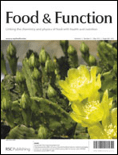
Food & Function
Scope & Guideline
Advancing the Science of Nutrition and Wellness
Introduction
Aims and Scopes
- Bioactive Components in Foods:
Research on the identification and characterization of bioactive compounds such as polyphenols, flavonoids, and peptides, and their physiological effects on health. - Nutritional Interventions and Health Outcomes:
Investigation of dietary patterns and specific food interventions in relation to chronic diseases, metabolic syndrome, and overall health. - Gut Microbiota Modulation:
Studies exploring how different food components influence gut microbiota composition and function, and the implications for health. - Food Processing and Functional Foods:
Research on the effects of food processing methods on the nutritional and functional properties of foods, and the development of functional food products. - Mechanisms of Action:
Investigating the molecular and cellular mechanisms through which food components exert their health benefits, including signaling pathways and metabolic processes. - Clinical and Preclinical Studies:
Conducting clinical trials and animal studies to evaluate the health benefits of food components and their potential therapeutic applications.
Trending and Emerging
- Microbiome-Gut-Brain Axis:
Research increasingly focuses on how dietary components influence gut microbiota and, in turn, impact mental health and cognitive functions, reflecting a growing understanding of the gut-brain connection. - Functional Foods and Nutraceuticals:
There is a rising interest in the development of functional foods and nutraceuticals that offer health benefits beyond basic nutrition, particularly in chronic disease prevention. - Personalized Nutrition:
Research is expanding into personalized nutrition approaches that consider individual variability in response to dietary components, influenced by genetics, microbiome composition, and lifestyle. - Food Technology Innovations:
Emerging technologies in food processing and preservation, such as nanotechnology and advanced encapsulation techniques, are increasingly being studied for their potential health benefits. - Sustainable Food Practices:
Research exploring sustainable dietary patterns and the health implications of plant-based diets is gaining traction, reflecting global trends towards sustainability and health.
Declining or Waning
- Traditional Nutritional Studies:
Research focusing solely on macronutrient profiles without considering the functional roles and bioactive properties of food components has decreased as the field moves towards a more holistic view of food. - Single Food Component Research:
Studies that isolate the effects of single food components without considering their interactions within complex food matrices and dietary patterns are becoming less common. - Basic Food Chemistry:
While foundational studies in food chemistry remain important, there is a notable shift towards applied research that connects food chemistry to health outcomes rather than focusing solely on chemical properties. - Food Safety without Health Context:
Research on food safety that does not integrate health implications or the role of food in disease prevention is becoming less emphasized in favor of studies that highlight health benefits.
Similar Journals

Food Production Processing and Nutrition
Elevating understanding of food's role in health and wellbeing.Food Production Processing and Nutrition, published by SpringerNature, stands at the forefront of advancing knowledge in the vibrant fields of food science, nutrition, and public health. This esteemed Open Access journal, operational since 2019, plays a pivotal role in disseminating breakthrough research that intersects food production processes with nutritional insights, making it an invaluable resource for researchers, professionals, and students alike. With a commendable 2023 impact factor reflecting its robust scholarly contributions — Q1 in Food Science and Q2 in both Nutrition and Dietetics and Public Health, Environmental and Occupational Health — the journal not only emphasizes the importance of innovative food processing methods but also addresses pressing nutritional challenges faced globally. Located in the United Kingdom, it claims an impressive Scopus ranking, with a notable percentile standing across various categorical metrics. As such, Food Production Processing and Nutrition is essential for anyone aiming to deepen their understanding of how food systems impact public health through effective processing and nutritional strategies.
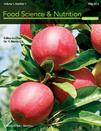
Food Science & Nutrition
Transforming nutrition research into global insights.Food Science & Nutrition is an esteemed peer-reviewed journal published by WILEY, dedicated to advancing the fields of food science and nutritional research. With an impressive impact factor and a prestigious Q1 ranking in the Food Science category, this journal stands out as a leading platform for innovative research, offering meaningful insights into the relationship between food composition and health outcomes. Since its transition to Open Access in 2013, Food Science & Nutrition has championed the global dissemination of knowledge, ensuring that vital research is accessible to researchers, professionals, and students alike. With a vast scope that encompasses both agricultural and biological sciences, the journal provides a comprehensive view of emerging trends, methodologies, and applications in food security and nutrition, making it indispensable for those invested in these critical areas.

EUROPEAN JOURNAL OF NUTRITION
Connecting Researchers to Revolutionize NutritionEuropean Journal of Nutrition, published by Springer Heidelberg, is a premier outlet for groundbreaking research in the field of nutrition and dietetics. Established in 1996 and set to continue its impactful legacy until at least 2024, this journal enjoys an impressive recognition, holding a Q1 category rank in both Medicine (miscellaneous) and Nutrition and Dietetics, with notable Scopus rankings that place it in the top 10% of its field. The journal facilitates open access options, enhancing the dissemination of knowledge across the globe. It serves as a vital platform for researchers, healthcare professionals, and students, promoting the exchange of innovative ideas and advancements in nutritional science that aim to improve health outcomes worldwide. With a commitment to quality and relevance, the European Journal of Nutrition continues to shape the future of nutrition research and practice.

Nutricion Hospitalaria
Elevating Standards of Care with Open Access Nutrition StudiesNutricion Hospitalaria is a distinguished open-access journal published by ARAN EDICIONES, S L that has been advancing the field of nutrition since its inception in 1989. With an ISSN of 0212-1611 and an E-ISSN of 1699-5198, this journal plays a vital role in disseminating innovative research and clinical studies within the realms of medicine and dietetics. Hailing from Spain, it has established itself as a reputable source of knowledge, holding a Q3 ranking in both Medicine (miscellaneous) and Nutrition and Dietetics, reflecting its commitment to scholarly excellence and the importance of nutrition in healthcare. The journal is especially valuable for researchers and healthcare professionals seeking to enhance their understanding of nutritional science and its application in practice. With open access since 2003, Nutricion Hospitalaria ensures that critical research findings are readily available to a global audience, promoting collaboration and knowledge-sharing in the pursuit of better health outcomes.
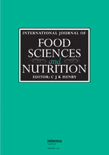
INTERNATIONAL JOURNAL OF FOOD SCIENCES AND NUTRITION
Connecting research and practice in food science.International Journal of Food Sciences and Nutrition, published by Taylor & Francis Ltd, is a premier, peer-reviewed journal that has established itself as a leading platform for the dissemination of cutting-edge research in the field of food science and nutrition. With an impressive Q1 categorization and an academic rank of #59/389 in Scopus’s Agricultural and Biological Sciences category, this journal is recognized for its significant impact, facilitating critical discussions and advancements related to food quality, safety, and nutritional health. Its historical significance, covering research from as early as 1947 to the present day, underscores the journal's long-standing commitment to scientific rigor and innovation. Researchers and professionals benefit from this journal's comprehensive and diverse range of studies, contributing to informed practices and developments in the food industry and public health. Although the journal is not open access, it provides various access options, ensuring that high-quality research is available to academics and practitioners alike. Stay connected with current trends and breakthroughs in food sciences and nutrition through this highly respected publication.
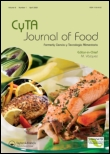
CyTA-Journal of Food
Connecting researchers to enhance global food systems.CyTA-Journal of Food is a prestigious academic journal published by TAYLOR & FRANCIS LTD, dedicated to advancing the field of food science and technology through the dissemination of innovative research and practical knowledge. With an ISSN of 1947-6337 and an E-ISSN of 1947-6345, this journal stands out with its strong impact factor and is currently placed in the Q2 quartile across multiple categories, including Chemical Engineering, Chemistry, and Food Science, making it a vital resource for researchers and professionals alike. The journal has been an integral part of the academic community since its inception in 2009, and continues to publish cutting-edge articles through to 2024. Its alignment with Scopus ranks further signifies its influence, notably achieving 67th percentile in Industrial and Manufacturing Engineering. As an Open Access journal, it ensures widespread accessibility to its valuable content, promoting collaboration and knowledge sharing among scientists, engineers, and students dedicated to enhancing food safety, quality, and sustainability.

Food Chemistry: Molecular Sciences
Driving Discovery in Food Chemistry and BeyondFood Chemistry: Molecular Sciences is a leading academic journal published by ELSEVIER, dedicated to advancing knowledge in the fields of food science and molecular biology. With an ISSN of 2666-5662, this journal is a key platform for researchers and professionals aiming to disseminate innovative research findings from 2020 through 2024. Recognized for its quality, it stands in the Q1 category for Food Science and Q2 for Molecular Biology as of 2023, showcasing its commitment to high-impact publications. The journal is indexed in Scopus, earning ranks of #98/389 (74th percentile) in Agricultural and Biological Sciences - Food Science and #214/410 (47th percentile) in Biochemistry, Genetics and Molecular Biology - Molecular Biology. Each article represents cutting-edge research that drives the understanding and application of molecular principles in food chemistry, making it an essential resource for anyone involved in the field. Although this journal does not offer open access, its rigorous peer-review process ensures that the content is reliable and of significant academic value, contributing profoundly to the body of knowledge in the respective disciplines. Located in Amsterdam, Netherlands, Food Chemistry: Molecular Sciences continues to inspire scholarly discussion and innovation within the scientific community.
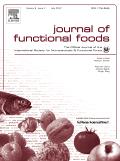
Journal of Functional Foods
Elevating Food Science with Cutting-edge ResearchJournal of Functional Foods, published by Elsevier, is a leading open-access journal that has been at the forefront of research in the fields of Food Science, Medicine, and Nutrition and Dietetics since its establishment in 2009. With an impressive impact factor and consistently high rankings in Scopus, being placed in the Q1 category for both Food Science and Medicine (miscellaneous), and Q2 for Nutrition and Dietetics, this journal provides a crucial platform for the dissemination of innovative studies and findings related to the health benefits of functional foods. Recognized for its rigorous peer-review process and commitment to open-access publication since 2020, the journal ensures that critical research is freely accessible to a global audience, facilitating knowledge transfer and collaboration among researchers, professionals, and students. With converged years extending through 2024, the journal continues to play a vital role in advancing the understanding of how food can influence health and nutrition, making it an indispensable resource for anyone working in these rapidly evolving fields.
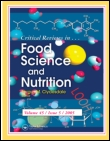
CRITICAL REVIEWS IN FOOD SCIENCE AND NUTRITION
Illuminating Innovations in Food ResearchCRITICAL REVIEWS IN FOOD SCIENCE AND NUTRITION, published by Taylor & Francis Inc, is a premier peer-reviewed journal dedicated to advancing the understanding of food science and nutrition. With its ISSN 1040-8398 and E-ISSN 1549-7852, this influential journal has established itself as an essential resource in the field, featuring high-quality reviews and critical analyses that foster innovation and knowledge sharing among researchers, practitioners, and academics. Recognized as a Q1 journal in Food Science, Industrial and Manufacturing Engineering, and Medicine (miscellaneous) for 2023, it ranks impressively within the top percentiles of its respective fields, making it a valuable platform for impactful research. Although the journal does not currently offer open access, it continues to attract a readership eager to explore the intricacies of food science and its applications, thereby shaping future advancements in the industry. With an extensive history dating back to 1981 and convergence up to 2024, CRITICAL REVIEWS IN FOOD SCIENCE AND NUTRITION remains committed to providing comprehensive reviews that illuminate contemporary challenges and solutions in the domain of food science and nutrition.

Acta Scientiarum Polonorum-Technologia Alimentaria
Unveiling Cutting-Edge Discoveries in Food ScienceActa Scientiarum Polonorum-Technologia Alimentaria, published by Poznan University of Life Sciences, is a revered journal in the field of food science, showcasing cutting-edge research and innovations in food technology. Established as a leading platform within its domain, this journal is indexed under Scopus and ranks in the 2023 Q3 quartile for Food Science, demonstrating its commitment to high-quality scholarship. With an ISSN of 1644-0730 and E-ISSN 1898-9594, it serves as a critical resource for researchers, professionals, and students seeking to stay at the forefront of advancements in food safety, quality control, and sustainable practices. The journal has also been recognized for its contributions to the agricultural and biological sciences, positioning itself at rank #205 out of 389 in this competitive field. While currently not offering open access, the journal's valuable insights and findings, especially as it publishes through 2024, play a crucial role in advancing knowledge and fostering collaboration among experts in the food science sector.